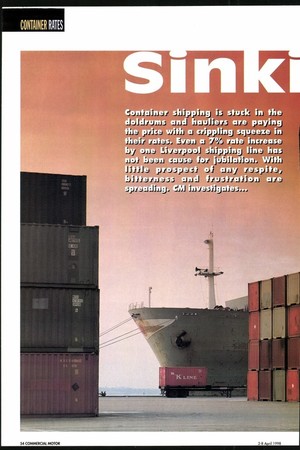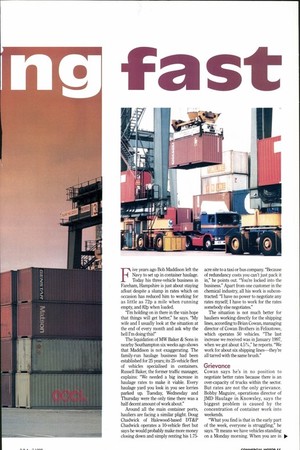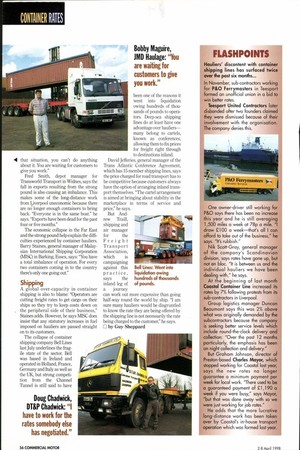fast Five years ago Bob Maddison left the Navy to
Page 56

Page 57

Page 58

If you've noticed an error in this article please click here to report it so we can fix it.
set up in container haulage. Today his three-vehicle business in Fareham, Hampshire is just about staying afloat despite a slump in rates which on occasion has reduced him to working for as little as 72p a mile when running empty, and 82p when loaded.
"I'm holding on in there in the vain hope that things will get better," he says. "My wife and I usually look at the situation at the end of every month and ask why the hell I'm doing this!"
The liquidation of MW Baker & Sons in nearby Southampton six weeks ago shows that Maddison is not exaggerating. The family-run haulage business had been established for 25 years; its 25-vehicle fleet of vehicles specialised in containers. Russell Baker, the former traffic manager, explains: "We needed a big increase in haulage rates to make it viable. Every haulage yard you look in you see lorries parked up. Tuesday, Wednesday and Thursday were the only time there was a half decent amount of work about" Around all the main container ports, hauliers are facing a similar plight. Doug Chadwick of Halewood-based DT&P Chadwick operates a 10-vehicle fleet but says he would probably make more money closing down and simply renting his 1.75 acre site to a taxi or bus company. "Because of redundancy costs you can't just pack it in," he points out. "You're locked into the business." Apart from one customer in the chemical industry, all his work is subcontracted: "I have no power to negotiate any rates myself, I have to work for the rates somebody else negotiates."
The situation is not much better for hauliers working directly for the shipping lines, according to Brian Cowan, managing director of Cowan Brothers in Felixstowe, which operates 50 vehicles. "The last increase we received was in January 1997, when we got about 4.5%," he reports. "We work for about six shipping lines—they're all tarred with the same brush."
Grievance Cowan says he's in no position to negotiate better rates because there is an over-capacity of trucks within the sector. But rates are not the only grievance. Bobby Maguire, operations director of JMD Haulage in Knowsley, says the biggest problem is caused by the concentration of container work into weekends.
"What you find is that in the early part of the week, everyone is struggling," he says. "It means we have vehicles standing on a Monday morning. When you are in • that situation, you can't do anything about it. You are waiting for customers to give you work."
Fred Smith, depot manager for Transworld Transport in Widnes, says the fall in exports resulting from the strong pound is also causing an imbalance. This makes some of the long-distance work from Liverpool uneconomic because there are no longer enough containers to bring back. "Everyone is in the same boat." he says. "Exports have been dead for the past four or five months."
The economic collapse in the Far East and the strong pound help explain the difficulties experienced by container hauliers. Barry Staines, general manager of Malaysian International Shipping Corporation (MISC) in Barking, Essex, says: "You have a total imbalance of operation. For every two containers coming in to the country there's only one going out" Shipping A global over-capacity in container shipping is also to blame: "Operators are cutting freight rates to get cargo on their ships so they try to keep costs down on the peripheral side of their business," Staines add& However, he says MSC does insist that any statutory increases in fuel imposed on hauliers are passed straight on to its customers.
The collapse of container shipping company Bell Lines last July underlines the fragile state of the sector. Bell was based in Ireland and operated in Holland, France, Germany and Italy as well as the UK, but strong competition from the Channel Tunnel is still said to have been one of the reasons it went into liquidation owing hundreds of thousands of pounds to operators. Deep-sea shipping lines do at least have one advantage over hauliers— many belong to cartels, known as conferences, allowing them to fix prices for freight right through to destinations inland.
David Jefferies, general manager of the Trans Atlantic Conference Agreement, which has 15 member shipping lines, says the price charged for road transport has to be competitive because customers always have the option of arranging inland transport themselves. "The cartel arrangement is aimed at bringing about stability in the marketplace in terms of service and price," he says.
But Andrew Traill, shipping and air manager for the Freight Transport Association, which is campaigning against this practice, says the inland leg of a journey can work out more expensive than going half-way round the world by ship. "I am sure many hauliers would be disgruntled to know the rate they are being offered by the shipping line is not necessarily the rate being charged to the customer," he says. by Guy Sheppard
























































































































